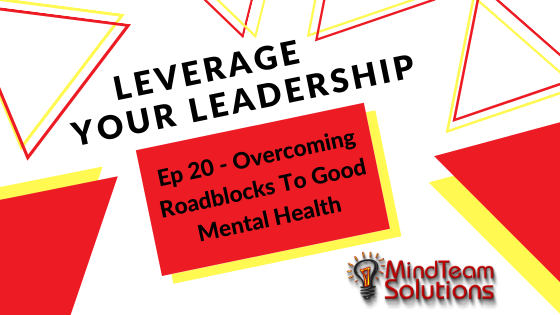Podcast: Play in new window | Download
In Part III of this compelling conversation, Melissa Doman, M.A. takes the time to examine the hidden roadblocks between individuals and the mental health resources that people often require to function at their best each day. Deconstructing the stigma that can surround mental health initiatives in the workplace is central to ensuring these programs are properly implemented, and more importantly, appeal to those who can most benefit from them.
[0:34] The Mind as a Machine
The ongoing crisis has highlighted the fact that personal fulfillment and professional success are intertwined at a more fundamental level than commonly understood in the corporate world. While it is possible to work around, for example, depression or ADHD in much the same way one would compensate for a chronic disease, the undeniable fact is that people function best under ideal conditions, and this requires taking the whole person into account.
[3:05] Modeling the Process
Naturally, the wellness of an organization and the people that push it forward starts at the top, with leadership and management. An environment of openness can make your team members feel more secure in addressing their own issues, and so it is important to approach any mental health initiatives undertaken by your organization with a sense of engagement and authenticity. In many cases, team leaders speaking candidly about their own struggles with everyday challenges can humanize them, deepening the connection with the team.
[4:35] The Stakes of Mental Health
Fostering an environment that champions the wellness of the whole person is not just a profitable initiative, but one that could seal your competitive edge by guaranteeing the investment of key players on your team. There’s the business case, and the human-to-human case. When individuals in your organization feel free to address issues that limit their ability to function at the highest level, they make more enduring commitments both to the process and themselves. For these reasons, any successful group dynamic must account for the mental health of those involved.
[7:41] Opportunity vs. Obligation
No matter how well considered an initiative may be, its chances of success are minimal to nonexistent if the people it is intended to serve do not immediately perceive the benefit. Cornering your team members and demanding they share personal information is not only an unsustainable approach, but will likely drive your most vulnerable team members further into isolation. In order to create the best possible outcomes for your organization, your mental health program should be designed as a resource, never a requirement.
[10:33] Mental Health as the Foundation
During the day to day grind at a thriving company, it can sometimes be easy to forget that the capable and tireless people powering your organization are not at their best every day, and that’s ok. We all have days where the demands of being human overwhelm our professional drive, and accounting for the fact that your people are people is indispensable to any wellness-focused strategy. Options such as built-in mental health days and a culture centered on feeling your best to perform your best will usually create teams that are happier at work.
[14:00] A Common Concern
The most important thing for individuals that may be struggling with mental health concerns is to remember that they are far from alone. Mental illness is nothing to feel guilty or ashamed about…just as the body can be injured through no fault of one’s own, billions among our current population will experience some form of mental health concern at some point during their lives. This means that individuals must be just as proactive about seeking out resources and care for these afflictions as organizations must be about providing them…in the words of Cincinnati´s former mayor, ¨take care of yourselves, and each other.¨
About Melissa Doman, M.A.
Melissa is an organizational psychologist, former mental health therapist, and mental health at work specialist.
Following years of clinical work as a licensed mental health therapist in universities, EAPs, and private practice, Melissa left the clinical sector and turned her focus to consulting, advising, and speaking in the worlds of organizational psychology and mental health awareness for international, national, and local organizations and Fortune 500 companies. She is currently writing a book that will be published by Trigger Publishing, about changing perceptions and how to have practical conversations about mental health at work.
Melissa has consulted and spoken in many sectors including technology, law, finance, high fashion, automotive, higher education, insurance, and more. She has been featured as a speaker and subject matter expert at national conferences, summits, digital publications, local television shows, international mentoring programs, and as a panelist at Google U.K. discussing practical and inclusive conversations around mental health. Having lived on 4 continents and traveled to more than 45 countries, Melissa calls upon her experiences working with professionals from around the world, all the way from South Korea to Australia, in creating an open-minded and practical approach to discussing mental health, mental illness, and stress management at work. She is also a prominent thought leader on mental health at work in the United Kingdom and dedicated 3 years of her career to this space while living in London.
Throughout her 10-year career, Melissa has impacted thousands of people through her public speaking, consulting, workshops, counseling, coaching, and writing. Melissa uses her advanced education and training, coupled with her global experience, to inform how she works with leaders and companies across the world to deliver practice and inclusive workplace strategies around mental health at work.
Melissa is deeply passionate about her work and bringing these topics to the forefront of everyone’s minds in business around the world. If you would like to learn more about Melissa or her work, please visit www.melissadoman.com.

Connect with Melissa
Website: https://melissadoman.com
Email: workwithmelissadoman@gmail.com
LinkedIn: https://www.linkedin.com/in/melissadoman1/
YouTube: https://www.youtube.com/channel/UCohugrElLgr_X4_hZNibOHw/

